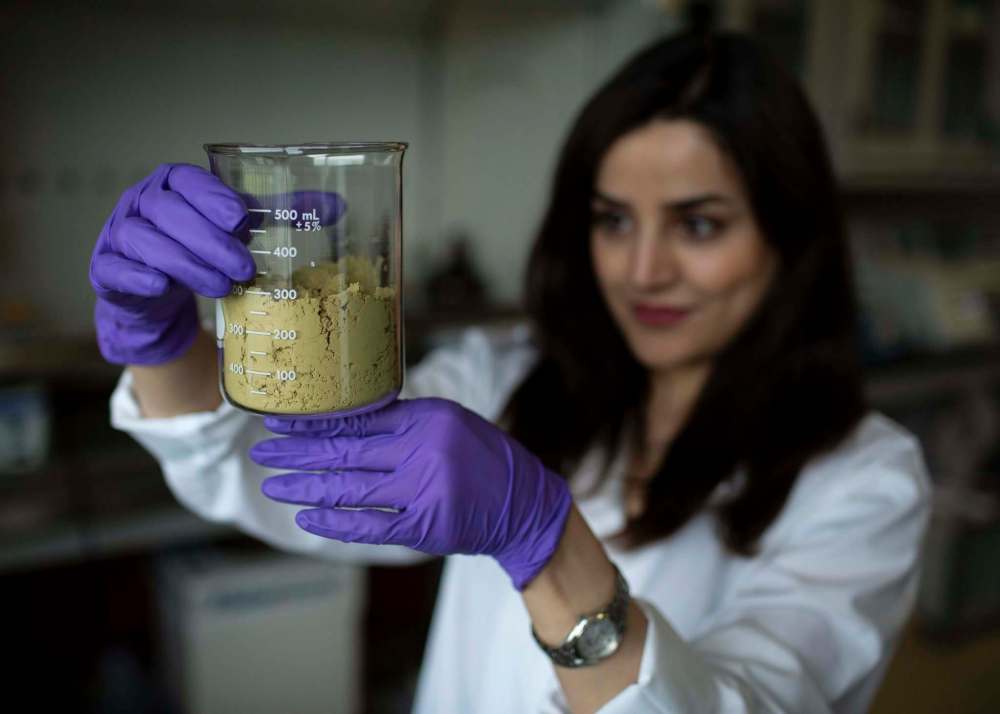How low can it go? Hemp seeds the focus of University of Manitoba blood pressure study
Read this article for free:
or
Already have an account? Log in here »
To continue reading, please subscribe:
Monthly Digital Subscription
$0 for the first 4 weeks*
- Enjoy unlimited reading on winnipegfreepress.com
- Read the E-Edition, our digital replica newspaper
- Access News Break, our award-winning app
- Play interactive puzzles
*No charge for 4 weeks then price increases to the regular rate of $19.00 plus GST every four weeks. Offer available to new and qualified returning subscribers only. Cancel any time.
Monthly Digital Subscription
$4.75/week*
- Enjoy unlimited reading on winnipegfreepress.com
- Read the E-Edition, our digital replica newspaper
- Access News Break, our award-winning app
- Play interactive puzzles
*Billed as $19 plus GST every four weeks. Cancel any time.
To continue reading, please subscribe:
Add Free Press access to your Brandon Sun subscription for only an additional
$1 for the first 4 weeks*
*Your next subscription payment will increase by $1.00 and you will be charged $16.99 plus GST for four weeks. After four weeks, your payment will increase to $23.99 plus GST every four weeks.
Read unlimited articles for free today:
or
Already have an account? Log in here »
Hey there, time traveller!
This article was published 18/06/2018 (2736 days ago), so information in it may no longer be current.
Pot makes people high. No news there.
What you may not know is seeds from hemp, which comes from a similar strain of the Cannabis sativa plant, can make you low, too. Your blood pressure, that is.
Just how effective hemp seeds are on blood pressure remains a subject of debate. But a new University of Manitoba study aims to shed more light on its ability to relax blood vessels.
The research taking place at the U of M’s Richardson Centre for Functional Foods and Nutraceuticals is focused on specialized protein powder made from the seeds of hemp — a version of cannabis with low concentrations of its active ingredient, tetrohydrocannabinol (THC) — which increases the bioavailability of an amino acid known to lower blood pressure.
“Hemp protein has a unique amino acid content with a high level of arginine,” says Maryam Samsamikor, a PhD student in the Food and Human Nutritional Sciences department, who is leading the study.

Widely found in plant and animal protein, arginine is a precursor to nitric oxide at the cellular level, which relaxes blood vessels and, in turn, lowers blood pressure.
Hemp seeds are particularly rich in this amino acid — only its molecular structure limits the amount that can be absorbed by the body. So the study has created a hydrolysate arginine additive derived from the seeds to augment the blood pressure lowering punch of hemp protein powder, she says.
“We hypothesize that this higher arginine content will lower blood pressure more than the others.”
Get involved
Samsamikor is looking to recruit 35 people with blood pressure readings between 130 to 160 systolic and less than 100 diastolic, specifically those who are not willing to take medication.
Want to sign up for the hemp protein blood pressure study? Email hempproteinstudy @umanitoba.ca or call 204-474-9989.
Those others being regular hemp powder and casein (a milk protein) powder.
All that’s required are participants. But not any warm body will do.
“If there are people out there with hypertension, specifically those who not willing to take medication, taking part in this study may be a good option for them,” says Samsamikor, adding the research requires 35 people with blood pressure readings between 130 to 160 systolic and less than 100 diastolic.
Sponsored by the Heart and Stroke Foundation of Canada, the research couldn’t be timelier, says Peter Jones, director of the Richardson Centre and a Canada Research Chair in Nutrition and Functional Foods.
“Her work resonates pretty well with the whole legalization of marijuana,” says Jones, who is overseeing the research.
Hemp is low in THC and thus has no black-market value. But it has long been grown for centuries for its protein and oil from seeds, which are also rich omega-6 and omega-3 fatty acids, and for fibre from its stalk.
Moreover, the crop grows well on the Prairies, making Manitoba potentially a global player in production as hemp’s health benefits become more widely known and established.
Its ascent as a potential superfood also comes at a time when the medical community, the public and the food industry are increasingly focused on nutraceuticals — food products that can treat or prevent disease.“If there are people out there with hypertension, specifically those who not willing to take medication, taking part in this study may be a good option for them.”–Maryam Samsamikor
Additionally plant protein has garnered a lot of attention in recent years.
“There’s a lot of interest from an environmental and sustainability perspective,” Jones says. “It is a big, new area in nutrition that asks how we can move away from the bacon-and-eggs type protein that is so intensive and costly from an environmental perspective.”
And a plant-based protein powder that reduces blood pressure would likely have even wider appeal. About one in five Canadians between the ages of 20 and 79 — 4.6 million people — have high blood pressure, Statistics Canada data show.
While medications work well, they sometimes have side effects such as dizziness, nausea and headaches. They can also make people feel tired and weak, or even anxious in some instances.
“So not everyone wants to use chemical medications to manage blood pressure,” Samsamikor says.

Already previous studies, including one done a few years at the Richardson Centre, found pea protein — which is also high in arginine — lowers blood pressure. Others have demonstrated hemp protein powder does the same.
But no study has endeavoured to do what this one aims to do, which is boost arginine’s availability.
“We’re not doing anything funky or pharmaceutical,” Jones says. “We’re just predigesting the protein and exposing the arginine amino acids, so they can do their job up front on those receptors in the gastrointestinal tract, moving straight to the central nervous system to reduce blood pressure.”
Samsamikor says participants in the study will wear special monitoring devices that will measure their blood pressure 24 hours a day.
“So it gives very accurate results for blood pressure,” she says. This is important because one-time readings can provide misleading results.
“People who go to the doctor can experience the white-coat effect, so their blood pressure is higher than it actually is,” she says. “So maybe they end up with medications in dosages that are higher than they actually need.”“We think there could be a lot of excitement generated if Maryam’s research shows this is going to be an effective way to reduce blood pressure.”–Peter Jones
The U of M study could help address that problem, leading to a non-prescription health product that individuals with moderate hypertension could take without concerns about their blood pressure falling too low, which is a risk with pharmaceuticals.
“It’s a little tricky to recruit for this study because people have to be hypertensive, but not have a blood pressure that is through the roof,” Jones says, adding those individuals should see their family doctor as soon as possible.
“We don’t want walking time bombs on this trial.”
But those who do make the cut — with moderately high blood pressure — will not only be potentially helping themselves. They could be helping others too by establishing that there’s more to cannabis than its heady high.
“We think there could be a lot of excitement generated if Maryam’s research shows this is going to be an effective way to reduce blood pressure,” Jones says.
“It could create a bit of a buzz.”
joelschles@gmail.com
History
Updated on Tuesday, June 19, 2018 9:20 AM CDT: Corrects spelling of cannabis
Updated on Tuesday, June 19, 2018 9:41 AM CDT: Adds reference to Heart and Stroke Foundation of Canada








